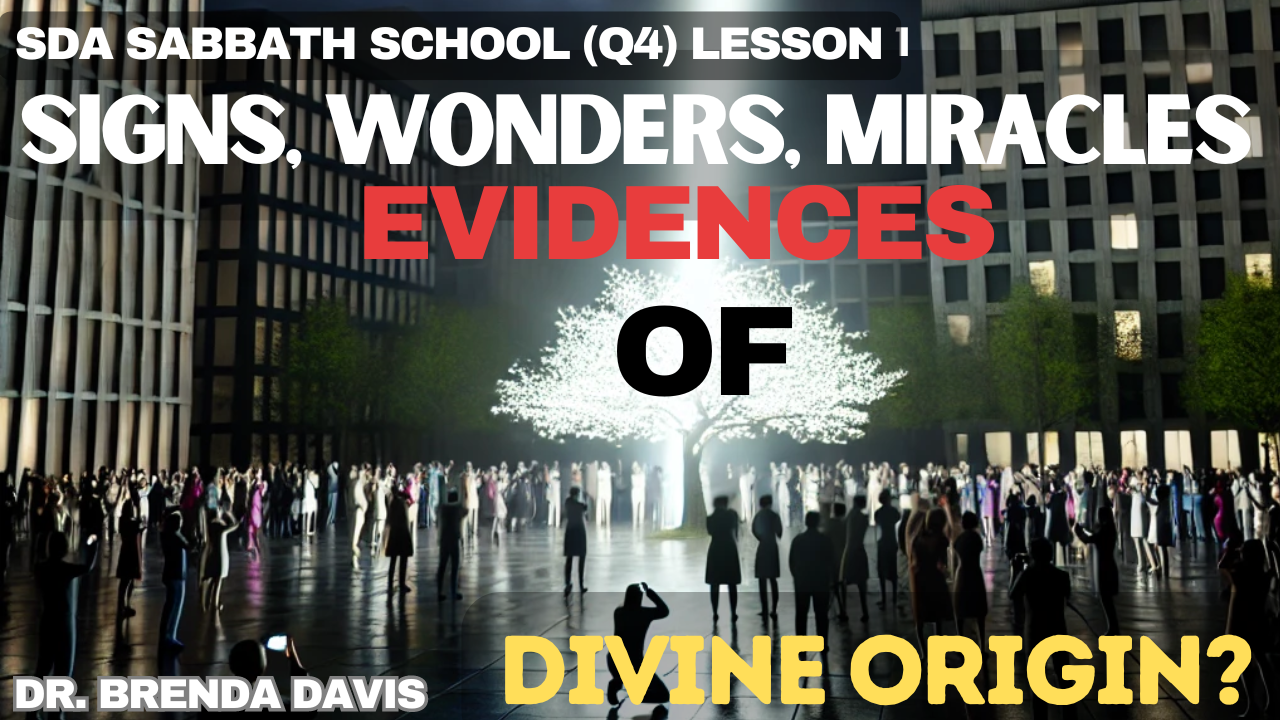Sabbath School Lesson Quarter (4) Ephesians (Lesson 8) Christ-Shaped Lives and Spirit-Inspired Speech Part 1-3
“GET YOUR FREE TOTAL MAKEOVER”
Have you ever wished you could start life all over again and get a total makeover, a new start, a new beginning? Well, you can.
We are continuing our study of the Book of Ephesians. Paul wrote Ephesians as a letter to the churches in Ephesus. The Ephesians were Gentiles, non-Jews who had accepted Christ.
This week we resume our study of Ephesians 4. Here Paul continues his theme of unity. Looking beyond unity between the Jews and the Gentiles, he points out that unity can only be accomplished when we experience the ultimate in a total makeover.
You may view our past and present videos at SabbathSchoolDaily.com.
You can obtain the study guide for this series at Sabbath.School or ssnet.org, all of which are at no cost to you.
Let Us Inviting God’s Presence:
God Most High, make us over again. Give us brand new lives. In Jesus’ Name, Amen.
A “total makeover” is about changing how you look and feel.
Let’s think of it this way: You know how sometimes a fresh coat of paint can make an old room feel new again? A total makeover is like giving yourself that fresh coat of paint on the outside.
It is like dressing up for a special occasion or getting a new look with a haircut or a different hairstyle.
It’s a small change that can help you feel like you’re stepping into a new adventure. Though we often don’t think of it that way, changing how we care for our minds and bodies is also a part of the makeover journey. Thus, makeovers are not just about looking different but about becoming different inside and out.
Paul addresses this type of makeover in Ephesians 4:22-24 when he says:
22 that you put off, concerning your former conduct, the old man which grows corrupt according to the deceitful lusts,
23 and be renewed in the spirit of your mind,
24 and that you put on the new man which was created according to God, in true righteousness and holiness. (Ephesians 4:22-24)
In Ephesians 4:17–32, Paul argues that when we allow Jesus to come into our hearts, He changes every part of our lives. Thus, in this sense, we do not only experience a makeover, but we become brand-new.
In other words, Jesus does more than change how we look. He gives us “a new mind and heart” Jesus changes our behavior. He gives us the ultimate makeover!
Why must we get a new mind and a new heart? Pause this video and read Ephesians 4:17-32 and Colossians 3:1-17. Then press play to continue to Part 2: The Downward Spiral of Sin.
Ephesians
(Lesson 8)
Christ-Shaped Lives and Spirit-Inspired Speech
Part 2: The Downward Spiral of Sin
If Jesus is not the one who does the makeover, it is not the ultimate makeover. Without the ultimate makeover, in which Jesus brings about the change, sin will drag us down to even greater evils.
Paul makes this point in Ephesians 4:17–32 and Colossians 3:1–17.
In Ephesians 4:1–16, Paul talks about the need for unity in the church of God. If you compare Ephesians 4:1 with Ephesians 4:17, you will notice that these verses are very much alike. Both verses talk about how to walk or live as Christians.
In Ephesians 4:17–24, Paul compares the Christians’ lifestyle to the lifestyle of the Gentiles (the non-Jews), who did not believe in God.
He warns in Ephesians 4:17–19 that living the lifestyle of the Gentiles is sure to destroy or undermine unity. (Split)
17 This I say, therefore, and testify in the Lord, that you should no longer walk as the rest of the Gentiles walk, in the futility of their mind,
18 having their understanding darkened, being alienated from the life of God, because of the ignorance that is in them, because of the blindness of their heart;
19 who, being past feeling, have given themselves over to lewdness to work all uncleanness with greediness. (Ephesians 4:17–19).
On the other hand, in Ephesians 4:20–24, Paul argues that the Christian way of living brings about unity.
20 But you have not so learned Christ,
21 if indeed you have heard Him and have been taught by Him, as the truth is in Jesus:
22 that you put off, concerning your former conduct, the old man which grows corrupt according to the deceitful lusts,
23 and be renewed in the spirit of your mind,
24 and that you put on the new man which was created according to God, in true righteousness and holiness. (Ephesians 4:20–24).
As we read Paul’s sharp evaluation of the corrupted lifestyle of the Gentile, we must keep in mind that the Gentiles who accept Christ are saved and have become members of God’s family.
Review Ephesians 2:11–22; Ephesians 3:1–13 again to discover more about the Gentiles becoming a part of the family of God.
Thus, in Ephesians 4:17-19, Paul briefly describes the lifestyle of “Gentiles in the flesh” (Ephesians 2:11). The lifestyle of a Gentile in the flesh is a life without Christ.
Interestingly, Paul isn’t just concerned about specific sins or bad behavior shown by the Gentiles.
What Paul is concerned about is their pattern of behavior. It is what happens when we are living in sin. (Split)
When we neglected to pray, when we cherished a spirit of self-confidence that says we do not need God. When we feel at Ease and seek to indulge ourselves in pleasure-seeking, we leave the stronghold of the soul unguarded, and we open the door for debasing thoughts to enter. (Patriarchs and Prophets)
This pattern of behavior leads to a downward spiral of continued sin.
What happens to the hearts of those who continue to sin?
Their hearts become spiritually hardened. In Ephesians 4:17 and 18, Paul describes this condition saying:
“in the futility of their mind, having their understanding darkened, being alienated from the life of God.”
In other words, our sin separates us from God. It causes our hearts to be hardened. Thus, it prevents us from understanding spiritual things. The heart grows hard “because of the ignorance that is in them, due to their hardness of heart. They have become callous” (Ephesians 4:18, 19 ESV).
Sin separates us from God and His saving grace. Paul explains that those who refuse to obey God lose their sense of shame in this downward spiral.
So, they do all kinds of evil. How can we get out of this downward spiral? Read Ephesians 4:20-24. Then continue to Part 3: A Dramatic Change of Clothing
Ephesians
(Lesson 8)
Christ-Shaped Lives and Spirit-Inspired Speech
Part 3: A Dramatic Change of Clothing (Split)
In Ephesians 4:20–24, Paul paints a picture of how Jesus changed the lives of the converted Ephesians.
He describes in Ephesians 4:20-21 that this conversion to Christ is so vivid that instead of having heard of or been taught about him, it is as if they had been directly taught in or by him.
Paul’s farther expresses that their adoption into the family of God changes their lives. We learn not just about Jesus; we get to know him. We have faith and believe that Jesus rose from the dead and is alive. We believe He lives in our hearts. We accept His teachings. We open our lives to the active guidance and direction given through his word and the power of the Holy Spirit.
Paul tells us that adopting a Christ-centered life is the ultimate makeover. In our ultimate makeover, we become loyal to Jesus as our Lord and Savior. We obey Him. We allow the Holy Spirit and the Bible to lead us.
He also tells us that a Christ-centered ultimate makeover requires three processes, which he expresses through clothing imagery:
- We must reject our old way of life (Ephesians 4:22).
- We must let God give us new hearts and minds (Ephesians 4:23).
- We must live holy lives (Ephesians 4:24).
Paul’s use of this imagery of changing clothes helps us understand how God changes us.
You see, in the Old Testament, clothes were used as a symbol for sinfulness, as in Psalm 73:6; Zechariah 3:3, 4; Malachi 2:16
Psalms 73:6
6 Therefore pride serves as their necklace; Violence covers them like a garment. (Psalms 73:6)
Zechariah 3:3-4
3 Now Joshua was clothed with filthy garments, and was standing before the Angel.
4 Then He answered and spoke to those who stood before Him, saying, “Take away the filthy garments from him.” And to him He said, “See, I have removed your iniquity from you, and I will clothe you with rich robes.” (Zechariah 3:3-4)
Malachi 2:16
16 “For the Lord God of Israel says That He hates divorce, For it covers one’s garment with violence,” Says the Lord of hosts. “Therefore take heed to your spirit, That you do not deal treacherously.” (Malachi 2:16)
Clothes were also used as a symbol of God’s saving mercy and grace, as in Isaiah 61:10; Ezekiel 16:8; Zechariah 3:4, 5.
Isaiah 61:10
10 I will greatly rejoice in the Lord, My soul shall be joyful in my God; For He has clothed me with the garments of salvation, He has covered me with the robe of righteousness, As a bridegroom decks himself with ornaments, And as a bride adorns herself with her jewels. (Isaiah 61:10)
Ezekiel 16:8
8 “When I passed by you again and looked upon you, indeed your time was the time of love; so I spread My wing over you and covered your nakedness. Yes, I swore an oath to you and entered into a covenant with you, and you became Mine,” says the Lord God. (Ezekiel 16:8)
Zechariah 3:4-5
4 Then He answered and spoke to those who stood before Him, saying, “Take away the filthy garments from him.” And to him He said, “See, I have removed your iniquity from you, and I will clothe you with rich robes.”
5 And I said, “Let them put a clean turban on his head.” So they put a clean turban on his head, and they put the clothes on him. And the Angel of the Lord stood by. (Zechariah 3:4-5)
In ancient Bible times, men wore a long shirt known as a tunic. The tunic was knee-length. A man wore the tunic as an undershirt. Then he wore a coat or robe on top of the tunic to protect him from the sun. Women also wore tunics and robes. The quality and style of the clothing worn indicated identity and status. People didn’t have many clothes because they were expensive, so they carefully cared for them and kept them for a long time.
The point here is that when someone changed their clothes and put on new clothes, this change was significant. It was a makeover.
The change commanded the attention of everyone around them. In using the image of changing clothes, Paul makes the point that when we become Christians, it is the same as changing clothes.
Jesus changes your life so much that it is the same as a person putting on brand-new garments for everyone to see. We experience a total makeover, the ultimate makeover.
If our ultimate makeover cannot be determined by how we look on the outside, how will others know we have experienced a makeover? Watch Part 4: Unity-Building, Grace-Filled Speech
——————————————————–
Thank you for watching this video. To be notified when our next video comes out, click the Subscribe button below. If you find this video beneficial, click Share. This will give me the ability to continue publishing these videos. Thank you for Sharing and Subscribing.
Hebron Seventh-day Adventist Church
7902 Wheatly Street
Houston, TX 77088
Watch Past and Present Lessons at SabbathSchoolDaily.com














Post Comment